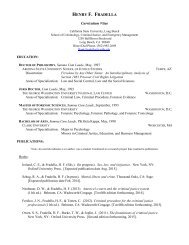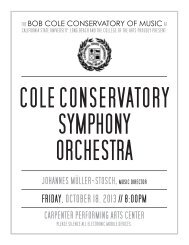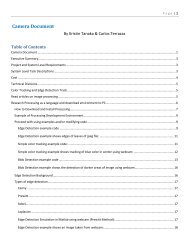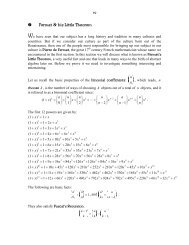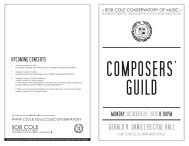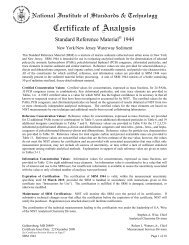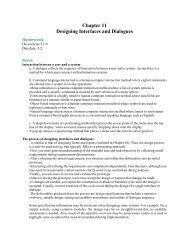Untitled - California State University, Long Beach
Untitled - California State University, Long Beach
Untitled - California State University, Long Beach
Create successful ePaper yourself
Turn your PDF publications into a flip-book with our unique Google optimized e-Paper software.
us,” stubbornly persists. Nevertheless, we remain conflicted over how to<br />
meet these obligations. How then to address the proverbial “problem of<br />
strangers” in an open but self-protective society? How to accommodate<br />
the values and beliefs of those who seem to oppose us, those beyond<br />
our borders with different political and religious ideologies? These are<br />
questions that I believe the rhetoric practiced by the ancient sophists and<br />
their postmodern descendants can help us try to answer.<br />
Sophistry and ‘rooted uprootedness’<br />
I would like to ground my discussion first by referencing the relatively<br />
recuperation of the ancient Greek sophists and their contributions to<br />
modern rhetorical scholarship by researchers Susan K. Jarratt and Steven<br />
Mailloux. From here, my paper will move chronologically and tropically,<br />
examining what I deem the sophists’ “rooted uprootedness” as key to<br />
their anti-foundationalism, their skepticism toward all absolute truthclaims.<br />
Against Plato and Aristotle’s charge that the sophists promoted<br />
a form of “bad rhetoric” that pandered to the prejudices and ignorance<br />
of its audience, I intend to make the opposite case: their rejection of<br />
moral certainties for moral contingencies provides methodological basis<br />
for discussing what is “good” and “true” that can extend the conversation<br />
and agreements beyond the polis to the cosmos, to forge what philosopher<br />
Kwame Anthony Appiah calls, in a similar effort, a global “ethic of<br />
strangers.” Moreover, when Socrates attempts to discredit Gorgias by<br />
inquiring, “Who are you?” in the self-same dialogue, I believe Gorgias’<br />
non-response rhetorically infuses the dialogue with an element of<br />
existential open-endedness denoting not only the alterity of the sophists<br />
as wandering “strangers” in the ancient Greek polis, but the shifting<br />
ontological ground of their discursive methodology.<br />
It is my view that the concrete and abstract “nomadism” of the<br />
2 | Olague<br />
sophists, both literally and figuratively, is an example of what Appiah<br />
has deemed a “rooted cosmopolitanism”—a global worldview between<br />
nationally-situated citizens throughout the world who share, or potentially<br />
share, basic values of human liberty and dignity (Nussbaum 276). The<br />
baseline for attaining this cosmopolitan ideal that Appiah argues for is<br />
most effectively achieved, as I see it, rhetorically, in particular, through<br />
the rhetoric advanced by the ancient sophists as emended by such modern<br />
philosophers as Friedrich Nietzsche, Kenneth Burke, Richard Rorty, and<br />
Stanley Fish. More specifically, a rooted cosmopolitan thus views the<br />
world as a continually expanding “imaginative discourse community”<br />
between strangers who freely partake in “free and open encounters”<br />
achieved through non-essentialist forms of discourse (Rorty 68). As a<br />
form of argumentation and persuasion that constantly interrogates<br />
entrenched values and beliefs, sophistic rhetoric is thus inherently political,<br />
facilitating agreements between opposing parties, if only contingently,<br />
insofar as the various contexts in which these agreements were made<br />
remain stable and unchanging (Mailloux 16). Viewing sophistic rhetoric<br />
as a deliberative political process in this fashion disallows personal beliefs<br />
and popular opinion to settle into dogma or harden into ideology. By this<br />
rubric, sophistic rhetoric is a means for uprooting politically motivated<br />
definitions of the “other,” providing a framework for beginning a global<br />
conversation over facts and their meaning, values and their importance,<br />
in which a cosmopolitan ideal, ethical agreements between strangers, can<br />
be obtained.<br />
Nomadic Rhetoric<br />
Reacting strongly against E.D. Hirsch’s call for a “cultural literacy”<br />
in the U.S., a shared cultural discourse over canonical knowledge and its<br />
importance to a “literate democracy,” educator Chris Anson famously<br />
Olague | 3



